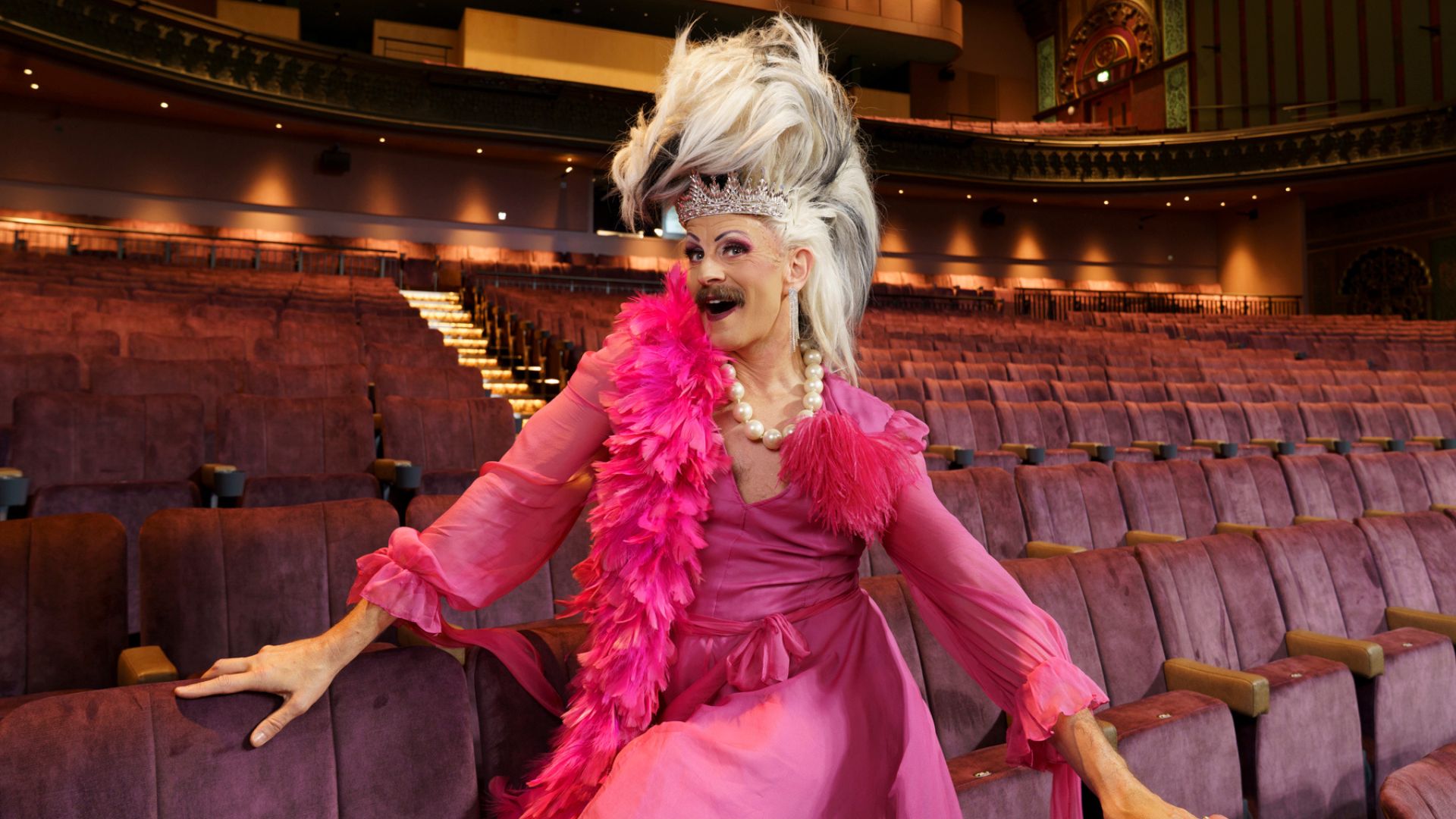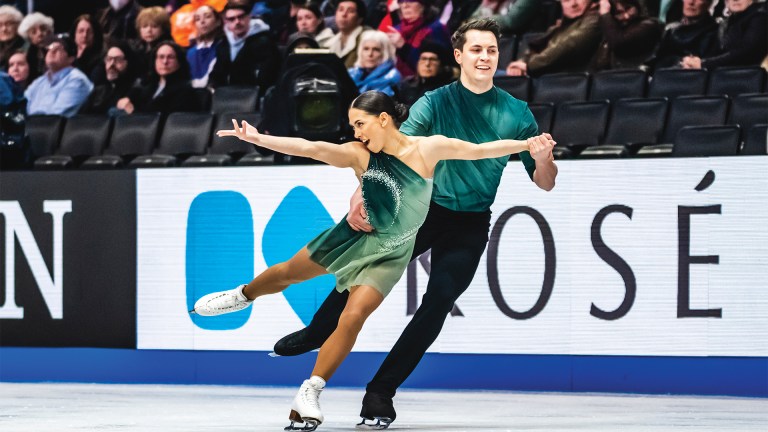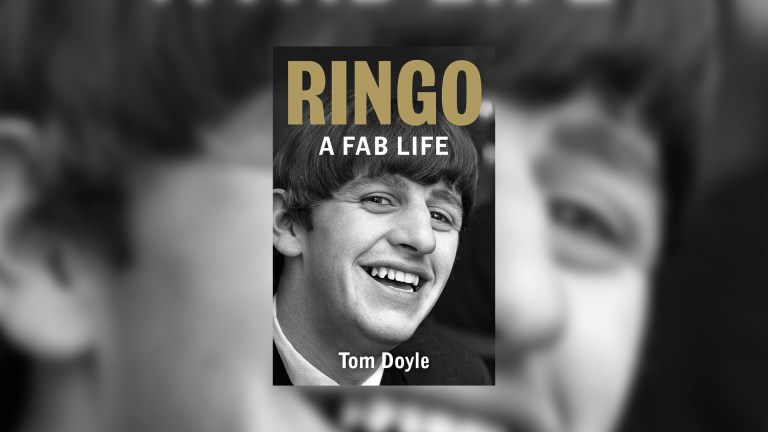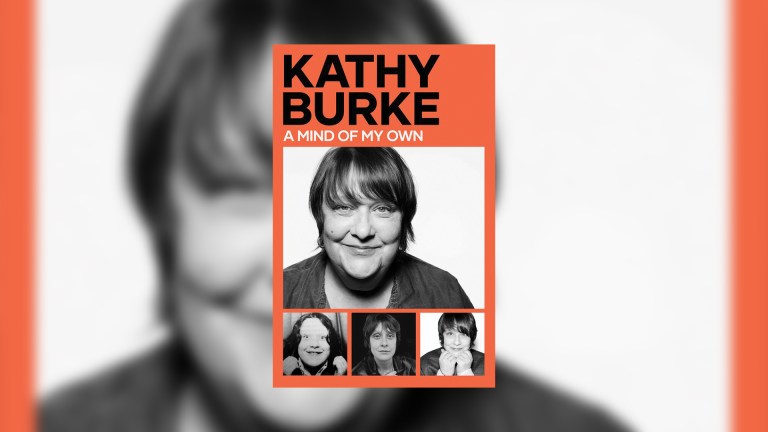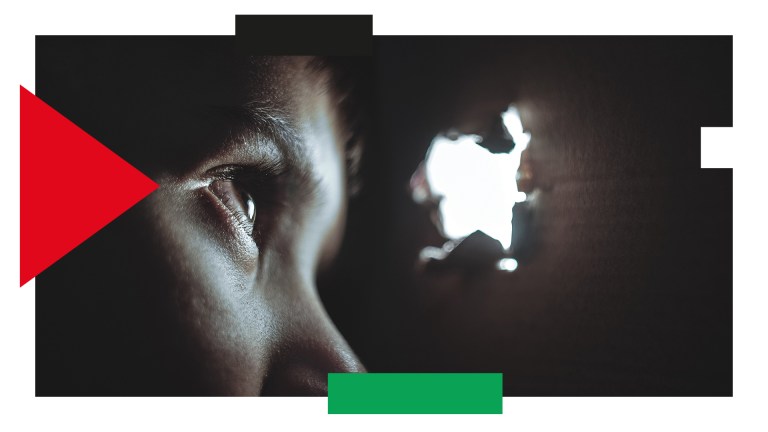“I like it when the old school and the new school come together,” says Woo. “I like it when feathers and sparkle meet dirt. And filth. That’s kind of what the UnRoyal is.”
Joining Woo on stage are underground pop icon Peaches, award-winning comedian Jayde Adams, drag sensation Myra Dubois, cult cabaret legend Dina Martina, and acclaimed clown Garry Starr – plus many more.
One week out from opening night, Big Issue sat down with Jonny Woo at Soho Theatre Walthamstow to talk all things UnRoyal.
BIG ISSUE: Is the variety show a lost art?
JONNY WOO: Can you see what we’re trying to do? [Most places] you either get comedy or music or something else, but not all together. We’ve got that, and clown variety, pole dancing, feminist performance art, drag. With the new faces, it’s like: ‘OK, you’ve got five minutes in the spotlight from 900 people. Do your thing.’ I’m trying let them know. It’s like, no, this is how you should be seen. You don’t need anything else. You are the moment and the star, and that’s it.
You did a show about Brexit, about how divided the UK was after the vote. Has division in the UK gotten better or worse?
Advertising helps fund Big Issue’s mission to end poverty
Worse. The show was satirically looking at how we collectively all responded to Brexit, and how we collectively responded to each other. My dad voted Brexit, and he’s allowed to – we are in a democracy. People are allowed to have differences of opinion. And there are times when the differences of opinions are polarising.
But we now live in a sort of prison where people who are anything right of centre say anyone who’s left is a ‘Loonie Left Communist’. And some people on the left think anyone on the right is a far-right fascist. And these polarities do exist, but I don’t think it’s the entirety of it, and I worry it might be fuelling the antagonism.
What’s the role of art in a society like that?
Well, our show is a coming together of community. I’m sure Peaches [a drag queen and film maker on the line-up] will be political, but in terms of the show itself, there’s something political in the act of a community galvanising, celebrating each other.
I don’t have detailed knowledge on what’s in the press. I pop down to Sainsbury’s and read the headlines. But I do have access to spaces like this, and The Divine [the LGBTQ+ bar that Jonny Woo opened in Dalston, East London], and I want to offer those spaces to artists in a time where queer identity is being divided, is being challenged, is being negated. I think it’s important that people are as visible as they can be, and we share in our experiences.
You opened The Divine earlier this year – the successor to The Glory [an iconic LGBTQ+ club/ pub in Hoxton, that closed its doors after the building was sold to a developer]. Are closures a threat to London’s queer nightlife?
Advertising helps fund Big Issue’s mission to end poverty
The narrative about closures has been going since 2014. It’s an old narrative. Yes, G-A-Y is closing on Compton Street. But there have been a lot of openings too. This place [Soho Theatre Walthamstow] has opened up. This place is so queer, come on. There’s Adonis monthly, 3,000 people, There’s Club Are, there’s Unfold, there’s The Rising in South London, there’s Betty and Jones, there’s The Divine, there’s [Dalston] Superstore.
London’s expensive. That is the problem. And that means property and space become expensive. You need people who have the guts to do it, are willing to risk money, can find money to do it. So it makes it tricky, but people have done it.
The Divine used to be a BrewDog.
That’s the straight citadel!
We’re going from the citadel of heterosexuality, which I’m totally down with, doesn’t bother me, but it was like, ‘Ok, we’ve got to make this place our own.’ So there’s loads of tinsel coating up now.
You mention queer identity being challenged. It’s been a tough year in particular for trans people since the Supreme Court ruling in April. Does performance have a role in fighting back against very public and increasing negativity?
Advertising helps fund Big Issue’s mission to end poverty
At The Divine, we have a lot of trans performers, non-binary performers, queer performers of all identities. Dalston is kind of like the Ground Zero, isn’t it? So this is where a lot of people affected by this come and share their experiences, find community, find strength, and find and find a dialogue and find a way through it.
The queer scene, the gay scene, the lesbian scene, are on the whole doing what we can to uplift people. Because we love the people we work with, it’s not just out of some obligation. We want to help people. If you have someone who wants to have top surgery, you get people going, ‘can I do a night’, and work something out so that they can get as much profit as they can to that person.
You grew up under Section 28, legislation which prohibited local authorities from “promoting homosexuality”. That was repealed in 2003. Things do change. How different are things now?
Queer in London now is very strong.
I mean I grew up under Thatcher. So, I learned very quickly to modify my behaviour so as not to get punched. You work out how you sit, how you stand, how you talk, what you wear.
There was a trend called casuals. I think if it came from football terraces, it was a sportswear trend, and it was like bleach jeans and a lot of pastels. I can remember when pink became acceptable to wear. At the end of the 80s, the New Romantics filtered down and crept into the upper high street, and then I was able to wear a satin search with a brooch. It was very freeing, but it was because all the straight boys were wearing it.
Advertising helps fund Big Issue’s mission to end poverty
Do you have a story to tell or opinions to share about this? Get in touch and tell us more.
Change a vendor’s life this Christmas.
Buy from your local Big Issue vendor every week – or support online with a vendor support kit or a subscription – and help people work their way out of poverty with dignity.
